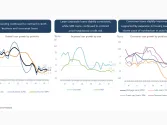
Why we should go green in shipping
By Nazery KhalidNazery Khalid assesses efforts in the shipping sector to go green
Cleaning up shipping’s act
Concern over the effects of pollution caused by shipping activities on the marine environment is growing. This is inevitable, considering that a majority of world trade and various key economic activities such as offshore oil and gas exploration and production, marine tourism and fishery involve ships of various kinds.
Underlining the seriousness of the issue, DNV Container Ship Update, an authoritative voice in container shipping, said that if no serious action is taken reduce shipping’s emissions, its portion of global CO2 emissions would increase from 2.7 percent currently to as much as 20 percent by 2050.
In a report published by Lloyd’s List in December 2009 titled ’Future of Shipping’, it was stressed that the shipping sector must adapt to a low carbon future and not delay any further to take actions to deal with the changes that lie ahead in a world that demands industries to curb carbon and GHG emissions.
Various initiatives and control measures have been introduced by the International Maritime Organization (IMO), a special United Nations agency in charge of shipping and ocean governance, to ensure pollution from ships are minimized and shipping activities are carried out in an environmentally friendly manner. These include technical and operational measures to reduce CO2 emissions, for example the introduction of Energy Efficiency Design Index and the Ship Energy Efficiency Management Plan, which IMO plans to make compulsory to the shipping industry.
A committee of the IMO, the Marine Environment Protection Committee (MEPC), advises the organization on matters pertaining to marine environment protection. MEPC’s work focuses on protecting the marine environment by coming up with guidelines in various aspects of shipping activities to reduce green house gases (GHG) and other pollutants from international shipping activities.
In addition to reducing GHG, the adoption of Annex III of the International Convention for the Prevention of Pollution from Ships (MARPOL) is also high on the agenda of MEPC. MARPOL is an international convention concerning regulations for the prevention of air pollution from ships. Annex III of MARPOL covers pollution from packaged goods carried by ships and includes issues relating to the implementation of ballast water management (BWM) and conventions on ship recycling.
Such efforts are in line with the International Maritime Dangerous Goods (IMDG) Code. This code, which has been made mandatory in the shipping industry, spells out that goods must be carried by ships in a manner which is compliant with the relevant provisions governing such goods. The adoption of Annex III marks a milestone in international shipping in its efforts to protect the marine environment and operate in a cleaner manner.
Mobilizing efforts
The threat posed by ballast water on the marine environment is one that demands serious attention. The presence of invasive alien species in local waters, as a result of the discharge of ballast water from ships’ tanks, can cause adverse effects to the marine environment.
In this regard, the international community has mobilized efforts to ratify the International Convention for the Control and Management of Ships' Ballast Water and Sediments, 2004. This important convention is aimed at preventing the spread of invasive alien species that can be harmful to the marine environment.
To this end, several ballast water management systems have been proposed by the Joint Group of Experts on the Scientific Aspects of Marine Environment Protection (GESAMP) and the Ballast Water Working Group set up to advise IMO on the control and management of ballast water and sediments.
IMO has also proposed reducing the sulphur content of bunker fuels starting 2010 on all ships and measures to limit nitrogen oxide emissions from engines on new ships starting 2011. However, the fuel industry is concerned about the global cap on sulphur content of marine fuels of 0.5% by 2020 from the existing maximum levels of 4.5%. This is because of risks to security of supply and to shippers and truckers in the event that the industry is not able to cope with timely construction of new refining facilities.
A study by the American Petroleum Institute in 2007 revealed that the fuel industry will be required to invest $126 billion over 13 years in equipment and chemicals in order to produce sufficient cleaner diesel in replacement of bunker fuel to supply the shipping industry.
Further underscoring the commitment of the shipping industry players to ‘clean up their act’ is their consideration of technical and operational measures to address green GHG emissions from ships. Various proposals made by IMO Member States are being considered at MEPC meetings at the IMO headquarters in London. MEPC has set up a Working Group to discuss issues pertaining to GHG and this group has, in its last few meetings, deliberated the possibility of implementing mandatory standards, along with the guidelines and formulas related thereto.
One of the measures to introduce GHG in shipping is to develop mandatory market-based measures (MBM) to be applied to the shipping industry on a global basis. This proposal entails introduction of a cap or ceiling on emissions to the global merchant fleet. The proposal has been hotly debated; strong objections have been heard against the proposed especially among developing nations which are dependent on trade for their economic growth.
Although several countries, at least in principle, recognize and appreciate efforts to reduce GHG from shipping, they feel that the proposal to introduce MBM to attain this objective runs counter against their interests. This is not surprising given the fact that they own much of the world’s merchant shipping tonnage but lack the technological and financial means of developed countries which stand to benefit more from MBM. The stand taken by developing countries is made on grounds that in their current form, the market-based instruments which have been proposed thus far do not address several issues which are of concern to developing countries.
The failure of these mechanisms to incorporate the principles of Common But Differentiated Responsibilities (CBDR) and the principles of international treaties such as Kyoto Protocol, which are still being negotiated, is at the core of the concern of developing countries. The developing countries fear that they will be disadvantaged by MBM to reduce emissions, owing to their lack of resources, despite the good intentions of introducing such market-based instruments.
Other items on the agenda of IMO to protect the marine environment include :
- Developing guidelines to ensure ship recycling activities are carried out in a safe and environmentally friendly fashion and in accordance with the Hong Kong International Convention for the Safe and Environmentally Sound Recycling of Ships (Hong Kong Convention) adopted in May 2009. In this regard, MEPC has deliberated exhaustively several draft guidelines for the safe and environmentally sound ship recycling, with the intention to develop a Ship Recycling Plan and for the authorization of Ship Recycling Facilities. The Working group strongly recommended IMO Member States to ratify the Hong Kong Convention and to review the plan for technical assistance aimed at supporting the early implementation of the Convention.
- Revising and updating MARPOL Annex V on Regulations for the prevention of pollution by garbage from ships, and the guidelines related thereto. This was made following a comprehensive review on the regulations and guidelines by a correspondence group set up to undertake the task.
- Deliberating proposals to designate certain maritime areas as Emissions Control Areas (ECAs) for the emissions of nitrogen oxide (NOX), sulphur oxide (SOX), and particulate matter under MARPOL Annex VI Regulations for the Prevention of Air Pollution from Ships. Such areas include certain waters near the coasts of Puerto Rico and the Virgin Islands. Should this proposal see the light of day, these two areas will join Baltic Sea, North Sea and North American ECAs as protected areas under Annex VI of MARPOL.
- Deliberating a proposal to amend MARPOL Annex IV on Prevention of Pollution by Sewage from Ships to consider designating Special Areas to prevent such pollution, and to designate the Baltic Sea as a Special Area under this Annex.
- Considering the merits of several proposals to designate certain maritime areas as a Particularly Sensitive Sea Area.
- Considering the implementation of the OPRC Convention and OPRC-HNS Protocol, based on a report of a meeting of the OPRC HNS Technical Group set up by MEPC.
IMO is taking an inclusive approach in its efforts to spearhead measures to ‘green’ the shipping sector. This is evidenced by IMO’s constant consultation with various stakeholders in the shipping sector including NGOs and interest groups, taking into account their perspectives and points of views in its effort to come up with a global regime to reduce GHG from shipping. Such groups include established organisations like Oxfam, World Wildlife Fund and Friends of the Earth.
Steaming ahead with the green agenda
It is heartening to see that there is growing awareness among the stakeholders in the shipping sector of the state of the marine environment and the role that the stakeholders of shipping must play to reduce emissions from shipping and to protect the marine environment. However, while no doubt genuine and admirable efforts have been and are being made to better manage and protect the marine environment and enhance social stewardship in the shipping industry, much more work needs to be done in this regard.
Efforts to increase environmental performance of the shipping sector imply that the stakeholders are taking serious initiatives to mitigate the adverse impacts of shipping to the environment. However, the implementation of these measures needs to take into consideration limitations and challenges faced by the industry players and policy makers.
IMO’s Greenhouse Gas Study updated in 2009 reported that the application of ‘known technology and practices’ could make vessels more efficient between 25 to 75 percent (depending on the type of vessels). However, adapting such technology and practices may open a Pandora Box of other issues. In the event that shipowners pass the costs incurred from ‘going green’ onto their customers, the latter will in turn pass their costs down to end users and consumers of the cargo they ship.
It can also be debated that given the considerable costs involved in practicing ‘green shipping’, there may not be much of an incentive for shipowners to increase efficiency of their ships to a level that will make a difference on a global scale. Unless they can gain competitive advantage by ‘going green’, or at least can avoid competitive disadvantage, it is hard to imagine that shipowners are going to adopt a voluntary technological revolution to change the entire shipping industry to a greener one. What more at a time when many of them are reeling from the crushing impact of global recession, credit crunch and falling demand for shipping services.
To ensure that the marine environment is well protected, and for the shipping industry to operate profitably while being fully observant of its corporate social responsibility, there must be in place, a solid framework of health, safety and environmental protection policies; a capable workforce; and a culture of operating in a ‘clean and green’ manner, among others. This not only will go a long way to reduce the strains on Mother Nature but will lead to sustainable business in the shipping industry and the cultivation of a positive image for international shipping.
Nazery Khalid, Senior Fellow / Research Coordinator, Maritime Institute of Malaysia




















 Advertise
Advertise






